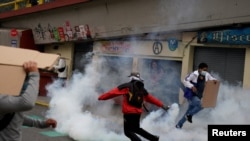The first week of dialogue between indigenous people and the Government in Ecuador has come to an end, seeking a space for consensus on the fuel price subsidy and other demands filed by the social movement.
“This is an issue that affects or benefits -depending on how you want to see it- all Ecuadorians,” said the Minister of Transportation and Public Works, Darío Herrera, at the conclusion of the first round that began on Wednesday.
The talks are expected to last for a period of 90 days, in the search for agreements around an agenda of ten social demands that motivated a recent strike that paralyzed the country for 18 days of protests.
Herrera is one of the highest officials participating in the talks. Fuel subsidies represent an annual expenditure of close to 3,000 million dollars to the Ecuadorian State. According to the government, between last January and May he allocated 1,700 million for that item.
“What we do need to be aware of is targeting, and that specific word has to do with optimizing these subsidies to the people who need the most and who really have to receive the benefit, right?”, the minister asserted.
To put an end to the protests, the government of President Guillermo Lasso agreed to reduce fuel prices.
“Since the subsidies began, 50 years ago, we have allocated more than 60,000 million dollars to fuel vehicles (…) The richest 20% of the population takes half of the fuel subsidy,” he assures the voice of america Alberto Acosta-Burneo, economic analyst.
To date, no government has succeeded in eliminating subsidies. Many question whether Guillermo Lasso will be the one to find a mechanism that serves to benefit those most in need.
While Leonidas Isaleader of the indigenous movement, reported that the coordination mechanisms, methodology and operational part for the dialogues were resolved, and the need to cross-reference data to consolidate the specific proposal was determined.
Iza reiterated her willingness to dialogue, but protested the legal proceedings being carried out against the demonstrators who carried out the most active protests in the almost three weeks of strike.
“The government must stop the disqualifications, we come with humility but we will not allow ourselves to be humiliated, while the dialogue progresses, more than 400 legal proceedings have already been opened against our colleagues,” Iza said in a Tweet.
*VOA journalist Néstor Aguilera contributed to this report from Quito. Information from AP was also used.
Connect with the Voice of America! Subscribe to our channel Youtube and turn on notifications, or follow us on social media: Facebook, Twitter and Instagram.





![[Img #74664]](https://thelatestnews.world/wp-content/uploads/2024/12/James-Watson-The-controversial-genius-behind-the-double-helix-150x150.jpg)











Add Comment